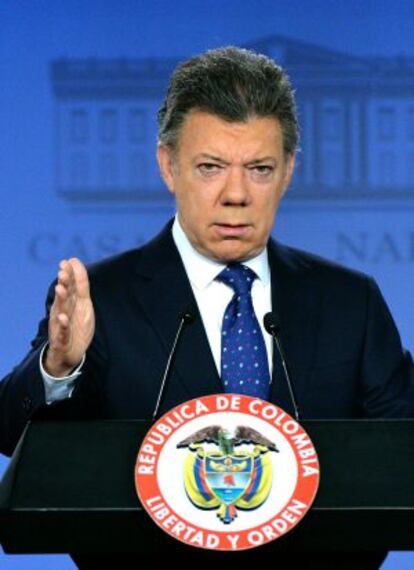Santos faces apathy but lacks serious rival in re-election bid
President comfortably ahead in the poll as predecessor Uribe rallies forces in opposition to FARC peace process

Following President Juan Manuel Santos' announcement that he will seek a second mandate next May, Colombia's political parties have started to make their moves.
If presidential elections were held today, the incumbent's main obstacles to re-election would be the abstention rate and a widespread skepticism on the part of many Colombians who feel that the country is headed in the wrong direction. Even so, surveys show that while Santos is by no means the most popular national leader of recent years, he still has no rivals who could seriously jeopardize his re-election.
The latest Gallup poll for several media outlets shows that blank votes would dominate the first round of voting, but that Santos would win in the second. Working in the president's favor is a renewed optimism following a partial agreement with the FARC guerrilla over the latter's political participation after a hypothetical laying down of weapons.
Also in Santos' favor is the fact that he has managed to consolidate National Unity, a coalition of four parties –Liberal, Radical Change, his own Party of the U and the Conservative Party– guaranteeing him a flow of votes that place him beyond the reach of other candidates. Among other things, this coalition has allowed Santos to pass legislation that was essential to the cause of the peace process with FARC.
The president's biggest challenge comes from Álvaro Uribe, his predecessor and main opposition figure, who has decided to head a Senate list in the elections.
Santos has also created tension within conservative circles, which are part of the government coalition and yet include politicians like former Defense Minister Marta Lucía Ramírez, who is seeking to be nominated as a presidential candidate. After learning about Santos' desire to seek re-election, Ramírez told the local media that with this decision, “the country feels some confusion. We are advancing without knowing very clearly where we are headed.”
When he was a minister he saw that terrorists are terrorists, and now he legitimizes them as political actors”
Right now neither the right nor the left of the political spectrum have a candidate who is strong enough to challenge Santos at the polls, surveys show. The opposition thus tends to focus on Uribe's movement. The former president, an outspoken critic of the FARC-government peace talks, is trying to promote his onetime finance minister, Óscar Iván Zuluaga, who is still not making much of a dent in the opinion surveys but seems destined to become the president's main rival.
As soon as Santos announced he was running once more, Zuluaga issued a press statement criticizing the government’s policies, including the peace process with FARC. “We will fight for a peace based on justice, not on impunity and political privileges for the narco-terrorists,” he said.
Meanwhile, his mentor Uribe did the same through his Twitter account, comparing Santos with Zuluaga.
“President Santos […] accepted when he was a minister and a candidate that terrorists are terrorists, and now he legitimizes them as political actors,” he tweeted.
What emerges from this political scene is that, as long as Santos can keep the National Unity coalition together, he has a solid base from which to secure a second term in office. The Liberal Party was one of the first to support the president, with its leader Simón Gaviria stating that his group identifies with the incumbent on many points, such as “the possibility of closing the chapter on violence.”
But the campaign is just kicking off, and the coming months will reveal whether the peace process continues to favor Santos, whether Uribists manage to consolidate their candidate, and whether the left gains some traction and joins the race for the Casa de Nariño presidential residence. The run for office will last until June of next year if a second round of voting is necessary.
Tu suscripción se está usando en otro dispositivo
¿Quieres añadir otro usuario a tu suscripción?
Si continúas leyendo en este dispositivo, no se podrá leer en el otro.
FlechaTu suscripción se está usando en otro dispositivo y solo puedes acceder a EL PAÍS desde un dispositivo a la vez.
Si quieres compartir tu cuenta, cambia tu suscripción a la modalidad Premium, así podrás añadir otro usuario. Cada uno accederá con su propia cuenta de email, lo que os permitirá personalizar vuestra experiencia en EL PAÍS.
¿Tienes una suscripción de empresa? Accede aquí para contratar más cuentas.
En el caso de no saber quién está usando tu cuenta, te recomendamos cambiar tu contraseña aquí.
Si decides continuar compartiendo tu cuenta, este mensaje se mostrará en tu dispositivo y en el de la otra persona que está usando tu cuenta de forma indefinida, afectando a tu experiencia de lectura. Puedes consultar aquí los términos y condiciones de la suscripción digital.








































